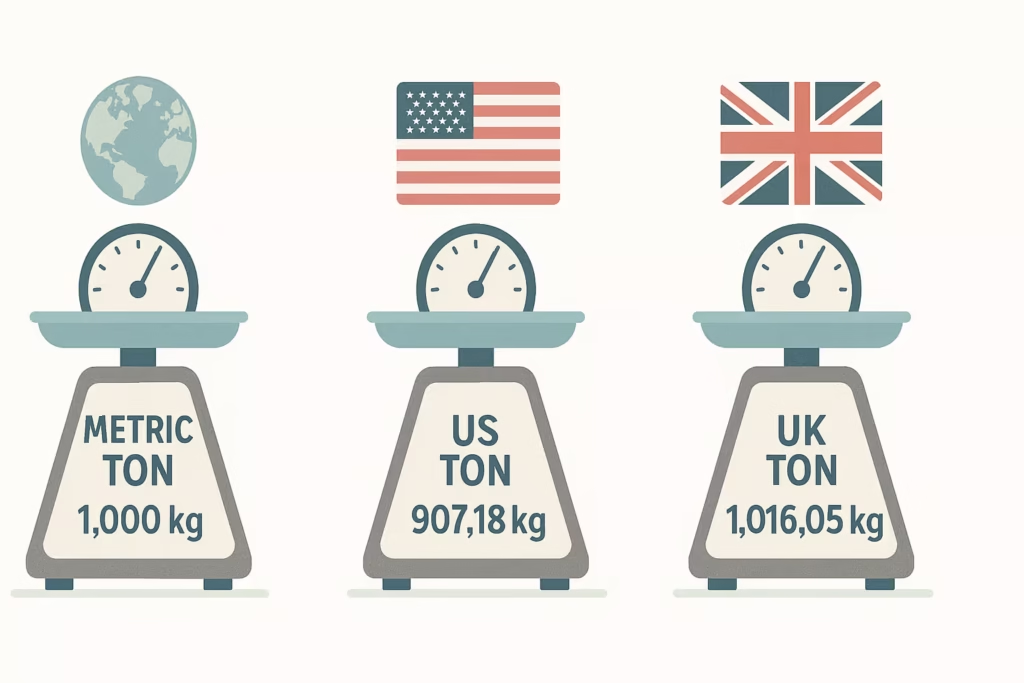When dealing with large measurements of mass or weight, it’s easy to get confused between similar-sounding terms like “metric ton” and “tonne.” While both are commonly used, especially outside the United States, they are not always interchangeable. If you’ve ever wondered what the difference between a metric ton and a tonne really is, you’re in the right place.

In this blog, we’ll break down these units of mass, explain where and how they are used, and help you understand the exact difference—so you never mix them up again.

What Is a Metric Ton?
The metric ton, also known as a tonne, is a unit of mass equal to 1,000 kilograms (kg) or approximately 2,204.62 pounds (lbs). It is used in most countries that follow the International System of Units (SI), which includes the vast majority of the world.
In short:
- 1 Metric Ton = 1 Tonne = 1,000 kg = 2,204.62 lbs
So yes, a metric ton and a tonne are actually the same thing. The confusion often arises from differences in spelling and from other types of tons used in places like the United States and the United Kingdom.
Related Calculator
Metric Tons to Other Metrics Converter | Quick & Accurate Unit Conversion
Convert Metric Tons to Kilograms, Pounds, Ounces, and more with our free online tool. Fast, accurate, and user-friendly conversions for…
Use This Calculator📁 More Weight & Mass Calculators
🔍 Explore All Weight & Mass Calculators
🇬🇧🇺🇸 Why the Confusion: “Ton” in the US and UK
The word “ton” has different meanings depending on the region.
In the United States:
- A ton usually refers to a short ton.
- 1 US Ton (Short Ton) = 2,000 pounds = 907.18 kilograms
In the United Kingdom (historically):
- A ton referred to a long ton.
- 1 UK Ton (Long Ton) = 2,240 pounds = 1,016.05 kilograms
Globally:
- Most countries, including the UK today, use the metric ton (tonne) in legal and trade contexts.
So when someone says “ton,” it’s important to consider which country they’re in and what system they’re using.
Weight Measurement Quiz
Weight Measurement Quiz

Quick Conversion Table
| Unit | Kilograms (kg) | Pounds (lbs) |
| 1 Metric Ton | 1,000 kg | 2,204.62 lbs |
| 1 US Ton | 907.18 kg | 2,000 lbs |
| 1 UK Ton | 1,016.05 kg | 2,240 lbs |

Where Is “Tonne” Used?
The spelling “tonne” is used primarily in:
- Europe
- Canada
- Australia
- New Zealand
- South Africa
- And most other countries that follow the metric system
It helps differentiate the metric ton (tonne) from other definitions of the ton.
Fun Fact:
Why It Matters
If you’re working in logistics, construction, agriculture, shipping, or any industry that deals with large-scale weights, understanding the difference between tonne, metric ton, and ton is crucial.
A simple mistake in assuming which unit is being used can lead to:
- Misquoted shipping weights
- Legal issues in contracts
- Overloaded vehicles or containers
- Miscalculations in budgeting or cost
Recap: Metric Ton vs Tonne
- Metric Ton = Tonne
- Both equal 1,000 kilograms
- Used globally in SI (metric) countries
- Different from US ton (2,000 lbs) and UK ton (2,240 lbs)
Pro Tip:
When reading international documents, look for context clues such as the country of origin, or units like “kg” or “lbs” nearby. If in doubt, ask for clarification—especially in contracts or technical documents.
Final Thoughts
Understanding the difference between metric ton, tonne, and other variations like the short ton and long ton can save you from a lot of confusion, errors, and even costly mistakes. Always be precise with units—especially when the difference could be hundreds of kilograms!

